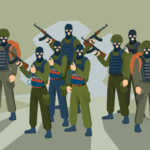Criminal Offences Relating to Terrorist Organisations, Declared Areas and Foreign Fighting

Federal Attorney- General Mark Dreyfus informed the public during a press conference on 28 December 2023 that two Australian citizens were killed during an air strike in Southern Lebanon the previous night.
The nation’s chief lawyer added that the listed terrorist organisation, Hizballah, had since claimed links to one of the men.
Mr Dreyfus then warned Australians not to travel to Lebanon due to risks associated with the ongoing conflict, before reminding us that, “[i]t’s an offence [for] any Australian to cooperate with, to support, let alone to fight with, a listed terrorist organization like Hizballah”.
The Attorney-General’s advice is correct: it is indeed a criminal offence for an Australian citizen or resident to be involved with a listed terrorist organisation.
These offences are contained in the Criminal Code Act 1995 (Cth), and include:
| Section | Offence | Maximum penalty |
|---|---|---|
| 102.2 | Knowingly directing the activities of a terrorist organisation | 25 years in prison |
| 102.3 | Intentionally being a member of a terrorist organisation | 10 years in prison |
| 104.4 | Knowingly recruiting for a terrorist organisation | 25 years in prison |
| 102.5 | Providing training to or being trained by a terrorist organisation | 25 years in prison |
| 102.6 | Funding a terrorist organisation | 25 years in prison |
| 102.7 | Providing support to a terrorist organisation | 25 years in prison |
| 102.8 | Associating with a terrorist organisation | 3 years in prison |
Fighting with a terrorist organisation can amount to any of several terrorism offences, from planning or preparing a terrorist act to engaging in an act of terrorism, each of which carry a maximum penalty of life in prison.
But what about the Attorney-General’s warning about not entering southern Lebanon? Is this in and of itself a criminal offence?
The short answer to the question is: no. While section 119.3 of the Criminal Code Act 1995 (Cth) empowers the Minister for Foreign Affairs to prescribe a ‘declared area’ whose entry can amount to a crime, there are no declared areas currently in effect.
However, the changing geopolitical climate could change the situation in the future: with fighting in many parts of the world including Gaza and the West Bank, southern Lebanon and of course Ukraine.
That being so, those planning on an overseas trip to a hostile region would be well-advised to check whether their destination is a declared area, as well as to be aware of potential criminal liability for engaging in conduct associated with conflicts.
Offences against entering declared lands and foreign fighting
The table below contains a list of offences that potentially apply to Australian citizens, residents and visa holders who travel to areas of armed conflict.
Clicking on the links will take you to the legislation itself.
| Section | Offence | Maximum penalty | Exceptions / statutory defences |
|---|---|---|---|
| 119.1 | Incursions into foreign countries with the intention of engaging in hostile activities | Life in prison | Being in the armed forces of the government of a foreign country or any armed force for which a declaration has been made under section 119.8(1) which covers the person and circumstances of the person’s service in or with the armed force |
| 119.2 | 119.2 Entering, or remaining in, declared areas | 10 years in prison | Being on the lands solely to provide humanitarian aid, to satisfy an obligation to appear before a court or other body exercising judicial power, to perform an official duty for the Commonwealth, a state or territory, perform an official duty for a foreign government or part thereof where the performance of the duty would not violate an Australian law, perform an official duty for the United Nations, Red Cross, to make a bona fide visit to a family member, or to make a news report of events in the area as a journalist or assisting a journalist. |
| 119.4 | 119.4 Preparing for an incursion into a foreign country to engage in hostile activities (which includes preparatory acts, accumulating weapons, providing or participating in training or giving or receiving goods for commission of the offence) | Life in prison | Engaging in the conduct solely by way of, or for the purposes of, providing aid of a humanitarian nature. |
| 119.5 | Allowing use of buildings, vessels and aircraft to prepare for an incursion into a foreign country to engage in hostile activities, | Life in prison | Engaging in the conduct solely by way of, or for the purposes of, providing aid of a humanitarian nature. |
| 119.6 | Recruiting persons to join organisations engaged in hostile activities against foreign governments | 25 years in prison | The conduct is for the defence or international relations of Australia. |
| 119.7 | Recruiting persons to serve in or with an armed force in a foreign country | 10 years in prison | Serving in the armed force in circumstances where a declaration under section 119.8(2) covers the person and the circumstances of his or her service in the armed force.
The conduct is for the defence or international relations of Australia. |
Going to court for a criminal offence?
If you are suspected or accused of committing an Australian criminal offence while overseas, call Sydney Criminal Lawyers 24/7 to arrange a free first conference with a specialist criminal defence lawyer who has an in-depth knowledge of, and is vastly experienced in, defending and winning allegations of Commonwealth criminal offences.
Receive all of our articles weekly
Related Articles
RELATED LEGISLATION
- Section 102.2 Criminal Code Act 1995 | Directing the Activities of a Terrorist Organisation
- Section 102.3 Criminal Code Act 1995 | Membership of Terrorist Organisation
- Section 102.4 Criminal Code Act 1995 | Recruiting for a Terrorist Organisation
- Section 102.5 Criminal Code Act 1995 | Training Terrorist Organisation
- Section 102.6 Criminal Code Act 1995 | Funding Terrorist Organisation
- Section 102.7 Criminal Code Act 1995 | Providing Support to Terrorist Organisation
- Section 102.8 Criminal Code Act 1995 | Associating with Terrorist Organisations
- Section 119.1 Criminal Code Act 1995 | Incursions into Foreign Countries with Intent to Engage in Hostile Actions
- Section 119.2 Criminal Code Act 1995 | Entering or Remaining in Declared Lands
- Section 119.4 Criminal Code Act 1995 | Preparing for Incursions into Foreign Countries to Engage in Hostile Activities
- Section 119.5 Criminal Code Act 1995 | Allowing the Use of Buildings, Vessels and Aircraft to Commit Offences
- Section 119.6 Criminal Code Act 1995 | Recruiting Persons to Join Organisations Engaged in Hostile Activities Against Foreign Governments
- Section 119.7 Criminal Code Act 1995 | Recruiting Persons to Serve In or With an Armed Force in a Foreign Country






